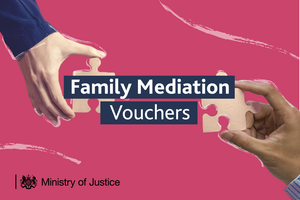Family mediation scheme to help thousands more parents
Thousands more separating parents will avoid stressful courtroom battles as the Government boosts its landmark family mediation scheme with an additional £1.3 million.

- Extra funding triples investment into Government mediation scheme since launch last year
- 4,400 vouchers already used to resolve disputes such as those involving financial or contact arrangements for children
- 77 percent of cases reach whole or partial agreements away from family courts
The extra investment is expected to help more families resolve disputes away from court, such as those involving financial or contact arrangements for children and takes investment in the initiative to more than £3m since its launch in March last year.
Today’s funding will provide 2,440 additional vouchers for mediation services – each worth £500 – with the aim of finding amicable solutions to couples’ disagreements and freeing up space in the family courts. It seeks to spare them going through often lengthy and costly courtroom battles, which can have a damaging impact on their children.
Mediation is often a quicker and cheaper way of resolving disputes. It involves couples working through their differences - led by a trained and accredited mediator – to reach agreements they are both prepared to accept, such as how to split assets or arrange child contact times, rather than have a judge decide for them.
Since its launch, 4,400 vouchers have already been used under the scheme with 77 percent of cases reaching full or partial agreements away from the family courts.
Deputy Prime Minister, Lord Chancellor and Secretary of State for Justice, Dominic Raab said:
I want to see children and their parents spared the stress and conflict of the courtroom as much as possible, and I’m delighted that thousands more will now have the opportunity to resolve their disputes in less combative way.
At the same time, it will free up vital capacity in the family courts to ensure the system can recover quickly from the pandemic.
Initial research from the Family Mediation Council (FMC), who run the scheme, shows promising results. Of the first 2,000 cases using the vouchers, more than three-quarters (77 percent) reached either a whole or partial agreement outside of court. Nearly half (49 percent) say they would not have considered mediation if the voucher had not been on offer.
The extra funding will be confirmed by Justice Minister Lord Wolfson tomorrow in a virtual speech to accredited mediators, marking the start of Family Mediation Week. In total the Government has invested just short of £3.3m into the scheme, following the initial £1m at launch and an additional £800k in August. The extra money will allow the initiative to run until the end of March.
If a case is eligible for vouchers, the mediator will automatically claim back the contributions from government.
Notes to editors
- In total, an extra £1.27 million is being invested in the scheme, bringing total funding to just under £3.3m since March 2021.
- The scheme is administered by the FMC, on behalf of the Ministry of Justice.
- Further information about the scheme and how it works is provided to parties at their Mediation Information and Assessment Meeting (MIAM), which all those involved in family cases are required to attend, unless they have a valid exemption.
- Mediation can be undertaken by other family members, not just separating parents.
- In June, 2020, we announced a major overhaul of the family courts to protect domestic abuse victims which included more special protections in courts, stronger powers for judges, and piloting Integrated Domestic Abuse Courts.
- In June, 2020, the Divorce Act received Royal Assent, which will remove the needless ‘blame game’ that can harm children while ensuring couples have the time to reflect, plan for the future, or if necessary to turn back. This is due to come into force later this year.
- We’re investing record amounts across our courts and tribunals, with £324m over the next three years to improve timeliness in civil and family courts and tribunals. Another £200m will complete our £1.3bn court reform programme, modernising the justice system to make it quicker and more efficient.
What is family mediation?
- Family mediation is a process in which an independent, professionally trained mediator helps parties work out arrangements for children and finances where there is a dispute.
- The mediator is not there to tell each side what to do, but can help them reach an agreement while trying to improve communication between them. They aren’t there to try and keep couples together but help them find a practical way forward after a relationship has broken down.
- Mediation allows the parties to stay in control, as no one will be forced to do or agree to anything against their wishes. Unlike in a courtroom both partners can agree to a solution rather than have a judge decide for them.
- The mediator will work with the parties, either together or separately, to help them find a solution which works for them both.
- Mediation can be less stressful than going to court, especially for children who are involved in proceedings. It is also cheaper than going through the court process, and it is also confidential unlike proceedings in the family court.
- Currently, funded mediation is available only for those who meet the financial requirements through the Legal Aid scheme. If you don’t qualify then you will need to pay for mediation sessions.
- Agreements made in mediation can be made legally binding by a court if necessary and the legal support to do this can be offered.